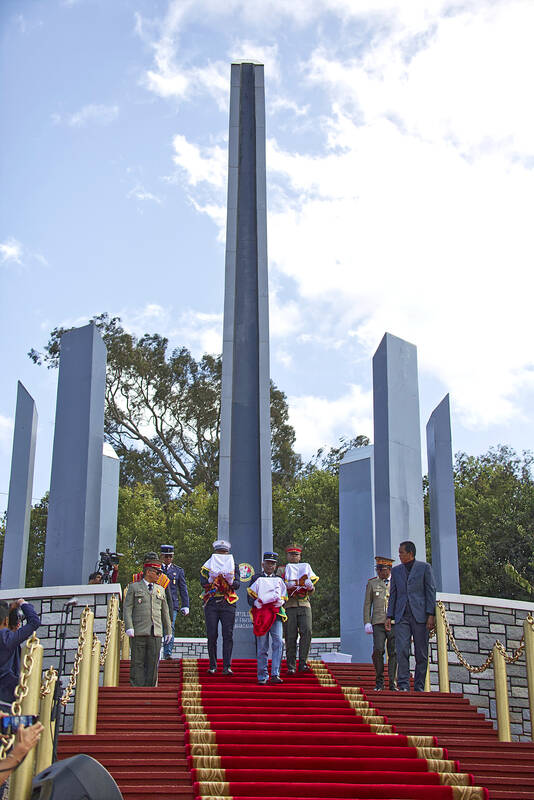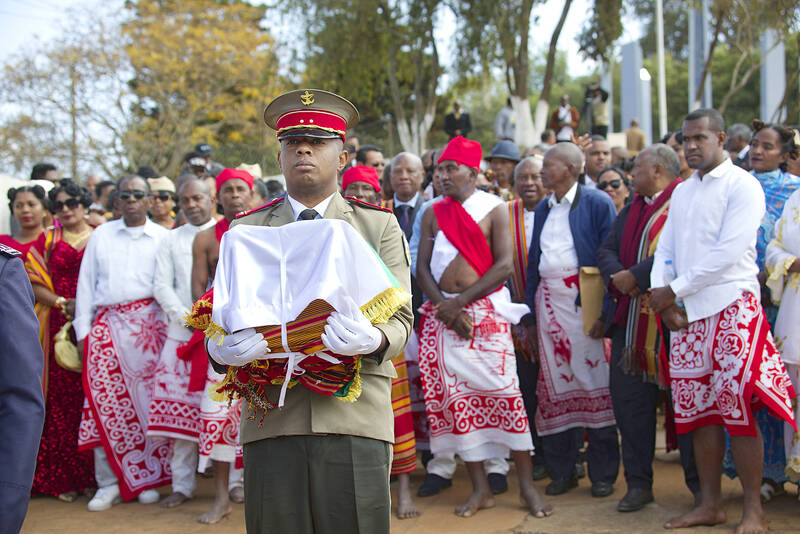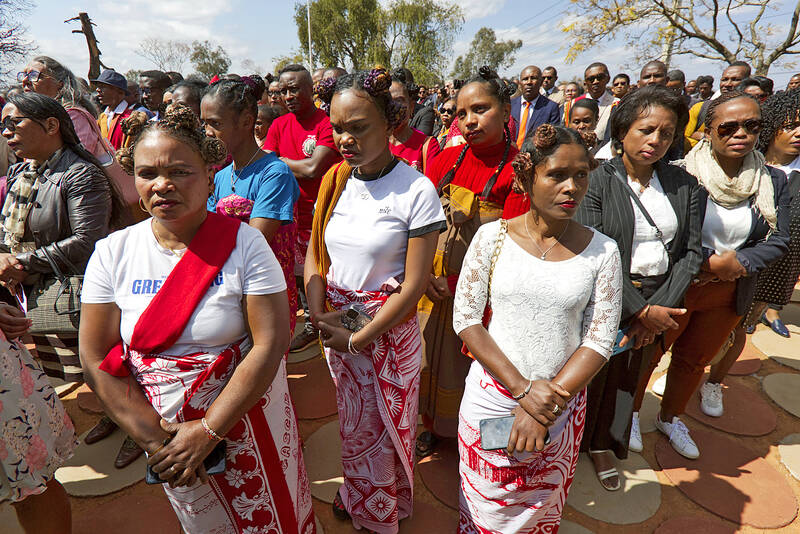Madagascar on Tuesday received three skulls of Indigenous warriors returned from France, including one believed to be of a king killed by French troops 128 years ago. It’s the first use of a 2023 French law regulating the return of human remains to its former colonies.
One skull is believed to belong to King Toera, the ruler of the once-powerful Sakalava kingdom on Madagascar’s west coast. French colonial troops took the skulls during violent clashes in 1897 and brought them back to France as trophies. They were then kept in a Paris museum alongside hundreds of other human remains from the former French colony, an island country off the southeastern coast of Africa.
Nearly 130 years after their forced transfer to France, the skulls were flown to Antananarivo, Madagascar’s capital. They were welcomed Tuesday in a solemn ceremony by political and military authorities, as well as members of royal families, at the Mausoleum of Avaratr’Ambohitsaina where prominent figures of the state are buried.

Photo: AP
“Today, in this historic place, we honor the martyrs of the nation who fought colonialism,” said Madagascar President Andry Rajoelina, standing before three coffins draped in the Malagasy flag. “The memory of their struggle must rekindle in us the flame of patriotism.”
LONG-AWAITED HOMECOMING
In a symbolic gesture, King Toera’s heir and great-grandson, the newly enthroned Sakalava King Harea Georges Kamamy, sprinkled his ancestor’s coffin with water from the sacred Tsiribihina River to “welcome him home.” The coffins will be reburied in Menabe, 800km from the capital.

Photo: AP
King Toera’s descendants requested the return of the skulls over 20 years ago. Their restitution is a “gesture of immense significance,” said Madagascar’s culture minister, Volamiranty Donna Mara, during last week’s restitution ceremony held in Paris.
The return of the skulls comes as European countries are increasingly forced to confront their colonial legacy, including theft of cultural artifacts and human remains.
According to researchers, nearly 90 percent of sub-Saharan Africa’s cultural heritage is located outside the continent. Most of it is being held in European museums and was largely acquired during the colonial conquests of the 19th and 20th centuries. Several European countries have put in place legal frameworks to return the artifacts, but the process has been slow and mainly limited to art objects.

Photo: AP
The restitution of human remains has been more fraught. Thousands of skulls and other skeletal remains have been looted from former colonies and brought to Europe to be displayed, traded and used for research, and are still being held in museums or private institutions.
FRANCE LAW ON HUMAN REMAINS
So far, France is the only European country to pass a law specifically tackling the restitution of human remains. It allows the authorities to handle the requests by a simple decree instead of putting in place laws governing individual demands, which had been the case before. The total number of human remains held in France is unknown, but the National Museum of Natural History in Paris where the Sakalava skulls were held, said it had more than 1,000 skeletons and 18,000 skulls.
Belgium holds at least 500 human remains from the Democratic Republic of Congo, Rwanda and Burundi in its public institutions, according to an official report by Belgian scientists in cooperation with the science ministry. Nearly half of the remains were removed from former colonies long after the Belgian government had taken over control from King Leopold. Two years ago the country drafted legislation to regulate the restitution of human remains, but it has been stalled by the change of the government. So far, it has only returned the tooth of Congo’s independence hero and first Prime Minister Patrice Lumumba, who was killed in 1961 after he fell out of favor with Belgium and the United States.
DEVELOPMENTS IN OTHER AFRICAN COUNTRIES
In 2018, Namibia regained 27 sets of human remains from Germany after more than a decade of negotiations. The remains, including 19 skulls, five full skeletons and fragments of bone and skin, had been held for decades in German hospitals, museums and universities. In Berlin, the repatriation ceremony in 2018 marked the culmination of talks that began more than a decade earlier. Three years later, Germany officially recognized the colonial-era killings in Namibia as genocide and pledged financial support for affected communities.
Elsewhere in southern Africa, Zimbabwe has pushed for the return of human remains. Without providing a number, the country’s home affairs ministry said the remains of 19th-century resistance fighters and spiritual leaders are “still dotted in British Museums.” In 2022, the Natural History Museum in London confirmed it held 11 remains from Zimbabwe and expressed willingness to return them after discussions with a visiting delegation.
Activists have staged protests outside the British High Commission in South Africa and launched the #BringBackOurBones campaign to keep the issue alive.
Zimbabwe’s former president Robert Mugabe once called the storing of skulls in European museums “among the highest forms of racist moral decadence.”
Earlier this year in Britain, the All-Party Parliamentary Group for Afrikan Reparations published a report on the African human remains collected by British museums, calling for their restitution and for banning all sales of human remains.
The continued presence and display of the remains “causes profound distress to diaspora communities and countries of origin,” the report said.

Under pressure, President William Lai (賴清德) has enacted his first cabinet reshuffle. Whether it will be enough to staunch the bleeding remains to be seen. Cabinet members in the Executive Yuan almost always end up as sacrificial lambs, especially those appointed early in a president’s term. When presidents are under pressure, the cabinet is reshuffled. This is not unique to any party or president; this is the custom. This is the case in many democracies, especially parliamentary ones. In Taiwan, constitutionally the president presides over the heads of the five branches of government, each of which is confusingly translated as “president”

Sept. 1 to Sept. 7 In 1899, Kozaburo Hirai became the first documented Japanese to wed a Taiwanese under colonial rule. The soldier was partly motivated by the government’s policy of assimilating the Taiwanese population through intermarriage. While his friends and family disapproved and even mocked him, the marriage endured. By 1930, when his story appeared in Tales of Virtuous Deeds in Taiwan, Hirai had settled in his wife’s rural Changhua hometown, farming the land and integrating into local society. Similarly, Aiko Fujii, who married into the prominent Wufeng Lin Family (霧峰林家) in 1927, quickly learned Hoklo (commonly known as Taiwanese) and

The Venice Film Festival kicked off with the world premiere of Paolo Sorrentino’s La Grazia Wednesday night on the Lido. The opening ceremony of the festival also saw Francis Ford Coppola presenting filmmaker Werner Herzog with a lifetime achievement prize. The 82nd edition of the glamorous international film festival is playing host to many Hollywood stars, including George Clooney, Julia Roberts and Dwayne Johnson, and famed auteurs, from Guillermo del Toro to Kathryn Bigelow, who all have films debuting over the next 10 days. The conflict in Gaza has also already been an everpresent topic both outside the festival’s walls, where

The low voter turnout for the referendum on Aug. 23 shows that many Taiwanese are apathetic about nuclear energy, but there are long-term energy stakes involved that the public needs to grasp Taiwan faces an energy trilemma: soaring AI-driven demand, pressure to cut carbon and reliance on fragile fuel imports. But the nuclear referendum on Aug. 23 showed how little this registered with voters, many of whom neither see the long game nor grasp the stakes. Volunteer referendum worker Vivian Chen (陳薇安) put it bluntly: “I’ve seen many people asking what they’re voting for when they arrive to vote. They cast their vote without even doing any research.” Imagine Taiwanese voters invited to a poker table. The bet looked simple — yes or no — yet most never showed. More than two-thirds of those